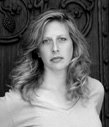
Longing Distance. Sarah Hannah. ( Tupelo Press PO BOX 539 Dorset Vermont 05251) $17. http://www.tupelopress.org/
I came with my set of prejudices when I started to read “Longing Distance,’ by Cambridge poet Sarah Hannah. From my experience reviewing a truck load of poetry books from people from the “academy,” I thought this would be another arcane, dry, and dead-on-arrival collection. I was dead wrong. Sarah Hannah has written a book of poetry that the populist poet from the small press and the mandarins from the Ivy Tower can admire. Hannah has a unique voice. Her work sucker punches you just when you think you got her down pat; and is alive with love, lust, regret, the whole ball of wax. In the poem: “Quarries, Quincy, Mass,” Hannah dives into this infamous quarry in which many a young lover has met his or her untimely end. Hannah captures the frenzied abandon of sex, and life literally on the edge. The poet describes herself and a “reckless beau,” as they grope each other on the edge of the abyss of treacherous waters in the quarry below:
And as you fumble underneath his faded baseball shirt that same
Delicious smell obliterates the outside air of stain:
His clothes, always surprisingly clean—a bright
Scent, almost orange, with a trace, just beyond
The cotton weave, of morning reefer. He springs
Your bra free, really a redundancy.
You reckon—“Gone missing,” that is, like saying
They have gone gone, unloosed, loosed, gone lost,
Tumbled down—like locals falling in, one after
Another, friends of friends, the same way, although
They knew how it could happen, and then he says
Your name, helplessly, and photograph and sign
Are jettisoned from mind, gone, gone, and he says
Your name again, relentless as the cadence sprayed in red
Across the northernmost rock face:
Fuck Beth. Jane Gives Good Head. (12)
The collection is full of wonderfully honed images and attention to detail. Here in “Manhattan, 5A.M.,” Hannah uses of all things a rooster in the maw of Manhattan that calls, much like the poet, to a wider world beyond the confines of the metropolis:
From night to day and bypassed dawn;
The neighborhood rooster calls,
Always late. Somewhere else it was decried
By birds, so loudly I couldn’t wander
Past it; windows rattled, sun razored
Through wet grass, and clover shook,
Anticipating bees. Somewhere else I had
To notice; there was fanfare and brigade, a litany
Of fowl, and not this lonely cock,
Twitching and strutting by a gated pane,
Spending himself for an alley. (32-33)
Sarah Hannah is an exciting new voice to watch on the literary landscape.
Doug Holder/Ibbetson Update/Somerville, Mass.
